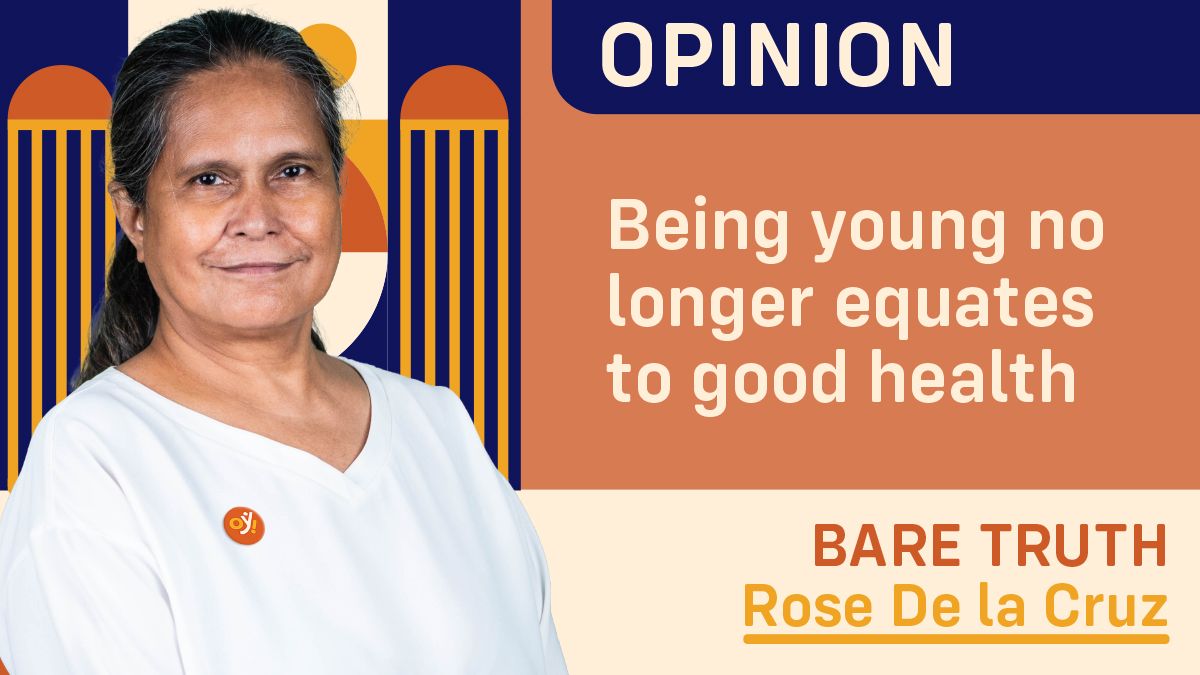In the past, old people always regarded the youth as being strong and healthy. They take pride in their sons and daughters being able to lift heavy loads, last for nights on end with little sleep and eat much (especially rice) as their source of stamina.
But it is precisely this unhealthy binge-eating of the worst kinds of food, lack of exercise or over indulgence on a single activity that has been eroding the health of our young people – who, because of abundant technology, have become lethargic, lazy and always yearning for ease and conveniences to their lives.
In a study presented by Manulife Philippines President/CO Rahul Hora entitled “In Wellness and In Health: Navigating the landscape of health, wellbeing and financial preparedness in the Philippines,” it was pointed out that "younger Filipinos are increasingly experiencing health issues."
The same study revealed that Filipinos still struggle to commit to a healthy lifestyle and that the average Filipino’s savings fall short of supporting future medical needs.
In addition, Filipinos aged 18 to 29 are sleeping and exercising less compared with other age groups because of a perception that following a regular exercise tourtine is expensives (at 68 percent), the Manulife website said.
Manulife said “cost remains a top barrier to Filipinos’ ability to adopt a healthier lifestyle. While 86 percent of survey respondents believe their health is determined by their lifestyle choices."
Hora said despite being well-informed, young Filipinos are facing a rise in illnesses and lifestyle-related issues, Hora said adding that mere knowledge is not sufficient and that solutions to these real-world barriers preventing them from practicing healthier lifestyles must be found.
The survey discovered that among all respondents the average number of sick days a year is 2.7 times, and this rises to an average of 3.4 times a year for those in ages 18 to 29.
Filipinos aged 18 to 29 are sleeping and exercising less compared with other age groups as they consider regular exercise as very costly. The lack of proper sleep and exercise and the tendency to neglect their overall health, can make younger Filipinos more susceptible to illness.
Ironically, this age group is also the most reluctant to change their lifestyles because of perceived “fear of missing out.”
“Despite diseases and disorders like anxiety, depression, and diabetes being the top health concerns of younger Filipinos, they spend much time nurturing their social lives and are less willing to change their habits because of perceived costs and inconvenience,” Hora noted.
The findings indicate that the respondents view a healthy diet as the most effective lifestyle habit against illnesses but only 30 percent admit that their current lifestyles are unhealthy and half claim their meals are not healthy.
Preconceived notions and lack of knowledge influence much how the youth view better diet and nutrition, with 46 percent saying that healthy meals are less appetizing and 35 percent finding it more difficult to prepare and find.
The misinformation among 25 percent of respondents is shown in their perception that only older Filipinos get critically ill while 21 percent think that eating habits and nutrition have very little or no impact on children’s mental development.
Hora said "misconceptions and perceived barriers, such as cost, taste, and preparation difficulty continue to hinder healthier lifestyle choices, which must be addressed through education and accessibility to ensure better health outcomes for all."
Two in three Filipinos surveyed think their health coverage is sufficient, the reality of healthcare financing paints a more challenging picture. The Manulife survey found that a significant portion of medical expenses, or about 41 percent, still comes out-of-pocket, with these costs predominantly sourced from personal savings.
This reliance on personal funds highlights a gap between the perceived adequacy of health coverage and the financial reality during medical emergencies and the gap puts a considerable burden on individuals and families, pointing to the stark truth that Filipinos may not be as financially prepared for health-related expenses.
The average Filipino sets aside P62,000 for future medical needs such as emergency services, hospitalization, and preventive healthcare but the younger Filipinos (18 to 29 years old) have saved only an average of P38,000.
Additionally, the respondents believe they need to save P571,000 to cover potential medical expenses over the next ten years, highlighting a substantial gap between current savings and future financial needs.
#WeTakeAStand #OpinYon #OpinYonNews #OpinYonColumn #ColumnbyRosedelaCruz #BareTruth

